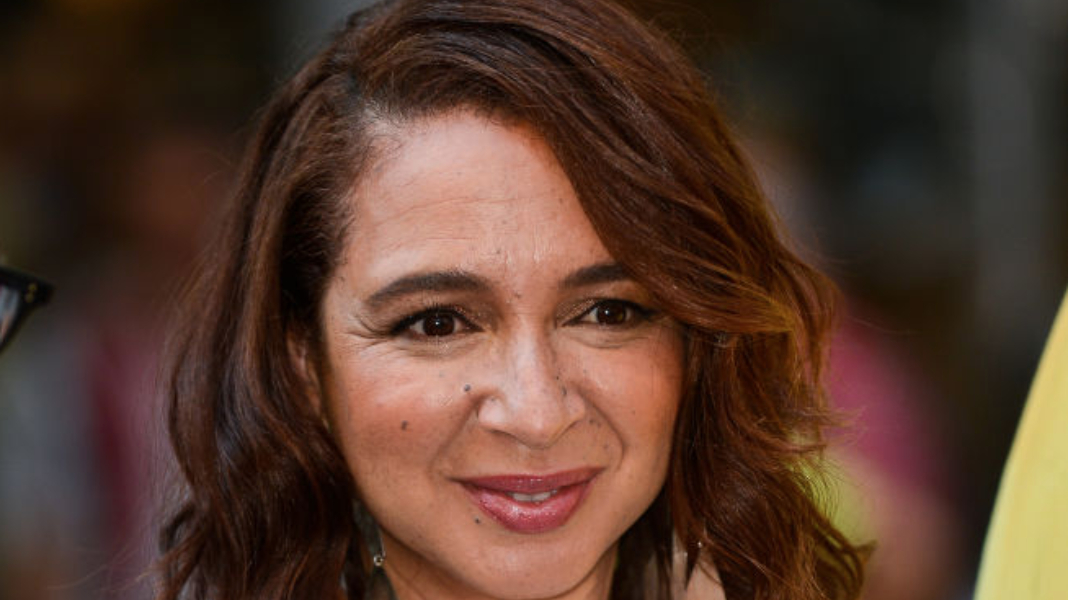
NEW YORK, NY – JULY 17: Actress Maya Rudolph leaves the ‘Good Morning America’ taping at the ABC Times Square Studios on July 17, 2017 in New York City. (Photo by Ray Tamarra/GC Images)
Like most Black folk of a certain age, I knew Minnie Riperton before I knew Maya Rudolph. And despite having a legendary mother, Rudolph has built a name of her own. And in doing so, she hasn’t really spoken extensively of about her mother. Part of that has to do with the fact that she lost her when she was so young. (Riperton died two weeks before Maya’s 7th birthday.) But also likely because the loss has been too hard to discuss with the public.
In fact, in a recent interview with The New York Times, Rudolph shared that appearing on the cover of Jet magazine with her father and brother two months after her mom’s passing made the grieving process public.
She also shared the difficulties she faced growing up as a biracial young girl without her Black mother. Being the only biracial child in her predominately White neighborhood in California, Rudolph said, “Meeting other mixed kids has always affected me. It was like part of a secret society.”
As far as discussions of race in her home, Rudolph said her parents said, “‘Be whatever you want to be. You’re beautiful. You’re unique.’ I was like: ‘Oh, unique. There’s always going to be a [expletive] name for what I am.’ Every SAT and test, it’s like, ‘What are you?’ I’m an ‘other.’ So attractive.”
And of course, her father, who Rudolph describes as a “pretty adorable Jew” didn’t know what to do with his daughter’s hair.
“So much of my childhood was dealing with my hair and being super embarrassed by it, mainly because I grew up being the only mixed kid.”
And when Rudolph visited her Black side of the family in Chicago, she didn’t feel she fit in there either.
“I never felt like my black cousins. I felt loved, but I didn’t feel culturally. …” She trailed off. “I was the kid that lived in California who didn’t grow up around the family.”
“I was just completely lost,” she said. “My mom died when I was 7, so when you don’t have a woman —” She cut herself off. “First of all, hair products that exist today did not exist when I was a child. The detangling system that I use now on my children is light-years beyond anything that would’ve ever happened to me growing up in Westwood.”
Rudolph would receive hair care when her Black aunts came to visit.
My neighbors used to say, ‘We could hear you screaming across the street.’ My aunties would come to town from Chicago and get the marcel iron out.”
The topic of Maya’s hair was constant, with strangers saying, “Your hair is so ethnic. Can I touch it?” (“No.”) “I actually have an aversion to that word, way more than people say they hate the word ‘moist.’ I hate the word ‘ethnic’ in that way. It’s like they’re talking about a print.”
Maya’s hair didn’t stop being a discussion when she grew up. Even when she joined the cast of “Saturday Night Live,” she still found that people didn’t know what to do with it.
“My hair was natural when I started ‘Saturday Night Live,’ but it was so thick to get under the wigs.” She shared that she started going through the rigorous process of straightening it, including a weekly blowout appointment with the head of the hair department, her friend Jodi Mancuso.
The blow-dry station “was on the same hallway as a lot of the dudes’ dressing rooms. And every [expletive] Friday night, we’d hear some [expletive] white guy walking down the hall going, ‘Is something burning in here? What’s burning?’ I’m like” — Rudolph’s lips and voice tensed, and she enunciated every exasperated syllable — “ ‘I’m. Get-ting. My. Hair. Done.’ ”
She explains how she combined humor and her “unique-ness” as a defensive mechanism.
“I know that part of owning being funny was an armor, and was, like, to literally not cry,” Rudolph said. “It’s a protection. Just be like: ‘Oh, yeah! I’m the lady with the crazy hair!’ ” Intentional zaniness, she said, is “so much better than the painful alternative. The alternative is I’m an ugly duckling. I’m just a weirdo.”
You can read the rest of Rudolph’s fascinating profile, here.









